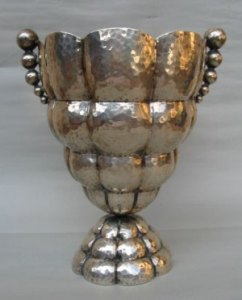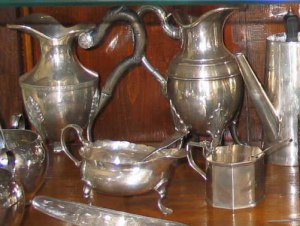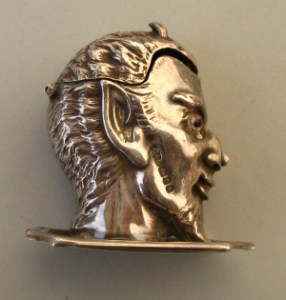Two new articles for ASCAS website

Giorgio Busetto presents:
Hallmarks of Italian silver (late 19th and
20th century)
Punzoni dell'argento italiano dall'unit�
d'Italia ai giorni nostri
In 1870, with the conquest of Rome and the end
of Stato Pontificio (Papal State), Italy
attained its unit and an unique system of
hallmarking was introduced in the Regno d'Italia
(Kingdom of Italy).
This is a brief history of Italian silver
hallmarks from 1870 to present days.
English
 /
Italiano
/
Italiano
 |

Giorgio Busetto presents:
Another way of documenting a silver
collection
To keep detailed records of his collection is of
particular importance for any collector.
Silver Magazine suggests the use of a
worksheet. Giorgio Busetto uses ... another and
less traditional way ... .
click here |
New members
Welcome to new ASCAS members:
Brian Allaker - England UK
Linda Andereggen - USA
Marc Anderson - Australia
Simone Bolla - Italy
Scott Burgess - England UK
Alex Chesun - USA
Julian Cousins - England UK
Judy DiStefano - USA
Linda Drew - USA
Gerald Fortier - France
Pierre Gagnaux - Switzerland
Tiziana Gardini - Italy
Alain Glotz - Belgium
Bill Horner - Australia
Gail Hunter - USA
Jim Kain - USA
Nigel Le Sueur - England UK
Pascal Jonnaert - Belgium
Victoria Korogodon - USA
William Malcomson - USA
Charly Mc Carthy - USA
Nancy Moon - USA
Wayne Robbins - USA
Barb Roberts - USA
Debbie Ross - New Zealand
Ann Smith - USA
Lucia Saccon - Italy
Steiner - USA
Daniel Tidwell - USA
Kelsey Vancleef - USA
Sally Wadley - Canada
How many collectors throughout the world have requested ASCAS membership this month !
Maybe ASCAS success depends from the relevance attributed to our Association by research engines (if you
type antique silver on
google research you'll find ASCAS website in the top positions of page 1)
Members' Window # 20

Giorgio Busetto presents:
Demons & Devils
Devils and Demons were often used as decorative
subjects for silver items. In this Members'
window we present a small selection of these
artifacts, ranging along three centuries of
European silver.
click here |
Questions from ASCAS members
Cathy Scott writes:
... recently purchased a child's silver cup and a
silver egg cup at a local auction. They are both stamped
with the mark attached.
It looks like Tezler (or maybe Fezler) but I can find no
reference to either of these spellings on the internet.
Do you know anything about this mark?
Also, each piece has "800" stamped above the maker's
name. What does that indicate?
Thanks,
Cathy Scott
The mark '800' is the silver purity degree (800/1000
silver is widely used in Europe).
I believe that your cup was made by Swiss firm Jezler.
This firm was founded in 1822 but I believe that your
cup is of recent manufacture.
I hope that ASCAS members will be able to supply other
and more informative detail about your piece.
Giorgio Busetto
Lucia Costa Velosa:
... I have some silver pieces, and the hallmarks are
Hungarian-Russian.
Hungarian hallmark is Diana's head and Russian is Ivanov
eagle
I'm wondering if that's possible.
Can anyone help me with this matter?
Thank you very much.
Mike Hallam writes:
... I bought four nice but used tablespoons today
as we need some for real use at home.
I assume they are silver plated and they carry no
obvious makers mark. The handles are almost plain 'old
english' style but do have six 'hallmarks' which I tried
to identify from the web without any luck.
I'm pretty sure the marks are therefore pseudo silver
marks but the spoons appear to be nicely made - so can
anyone explain them please.
Kind Regards, Mike Hallam
Replies to members' questions
Dorothea Durstyn writes:
A) The basket is made by the Neresheimer company, the
crowned C-mark is number 514, page 534 in Wolfgang
Scheffler: Goldschmiede Hessens. This mark was found on
two more handled sugar bowls with putti and flower
decoration and is listed of having a blue glass insert.
The basket is one of the more commercial products, the
firm mass-produced. Neresheimer also produced highly
artistic work for international exhibitions, etc.
Neresheimer was founded 1890 and was taken over 1934 by
the manager of the firm, Dr. H.Bauer. I think the firm
is still active.
B) The firm of August Schleissner was an old Hanau firm,
dating back to the middle of the 19th century and known
for its quality output. August Schleissner was one of
the master chasers. The firm is also still in existence.
C) Berthold Mueller was an import firm, who distributed
a lot of Neresheimer silver - see John Culme: The
Directory of Gold-and Silversmiths, Jewellers and Allied
Traders 1838-1914, Vol.1 page, page 335. The firm
changed its name 1915 to Berthold Miller and was listed
as wholesale silversmiths and jewellers, antique
reproduction in silver, ivories, miniatures, enamels,
and so forth.
D) The firm of J.G.Piddington was independent of
Berthold Miller and an import firm in their own right,
see Culme, page 423 under John George Smith &Co. The
shipping and forwarding business was founded in 1849,
the firm was a partnership between J.Friend and J.
Piddington. The grandson of Piddington, John G.Smith jr.
took the surname of his grandfather in 1900. J.G. Smith
& Co are "noted to have imported a great deal of silver,
apparently an important part of their business until
1939. Many of these items, decorative in nature, to be
of German origin. A privately printed and illustrated
history of this firm exists, called 'Vitesse, The Story
of Continental Express', published in 1949.
I hope this clears up some of the questions Leslie had.
Best regards
Dorothea
B. Hough question about the hallmarks of his vase
receives this reply.
Fred Sinfield writes:
... In answer to the question from B. Hough.
The makers were Atkin Brothers of Sheffield after 1853.
A handy pocket size book is 'Sheffield & Birmingham
Victorian Electroplater, Book of Marks' by Andrea De
Giovanni, 1991. Editrice Militare Italiana Ivo Fossati,
English edition.
Regards,
Fred.
This month two articles and the ' members' window ' are written
by Giorgio Busetto, who is also the author of the text
of this Newsletter.
This massive presence of written works by ASCAS
Secretary is not an editor's choice but the result of
the unavailability of writings supplied by other ASCAS'
members.
Obviously, without members' support I'll be unable to
maintain on next Newsletters the rate of two new
articles per month and also the monthly frequence of
ASCAS Newsletter will be modified.
I trust in your support of articles, photos and
information to maintain (and improve) the level of the
Newsletter.
Closing our December edition I hope you have appreciated
its content.
Your comments, suggestions and advice will be of great
help.
My thanks to Dorothea Burstyn (Canada), Lucia Costa
Velosa (Romania), Jayne Dye (USA), Mike Hallam (UK),
Fredric Sinfield (Australia), Cathy Scott (Canada) for
their invaluable contributions.
Giorgio Busetto
Secretary
|
 newsletter # 20 December 2005
newsletter # 20 December 2005 newsletter # 20 December 2005
newsletter # 20 December 2005